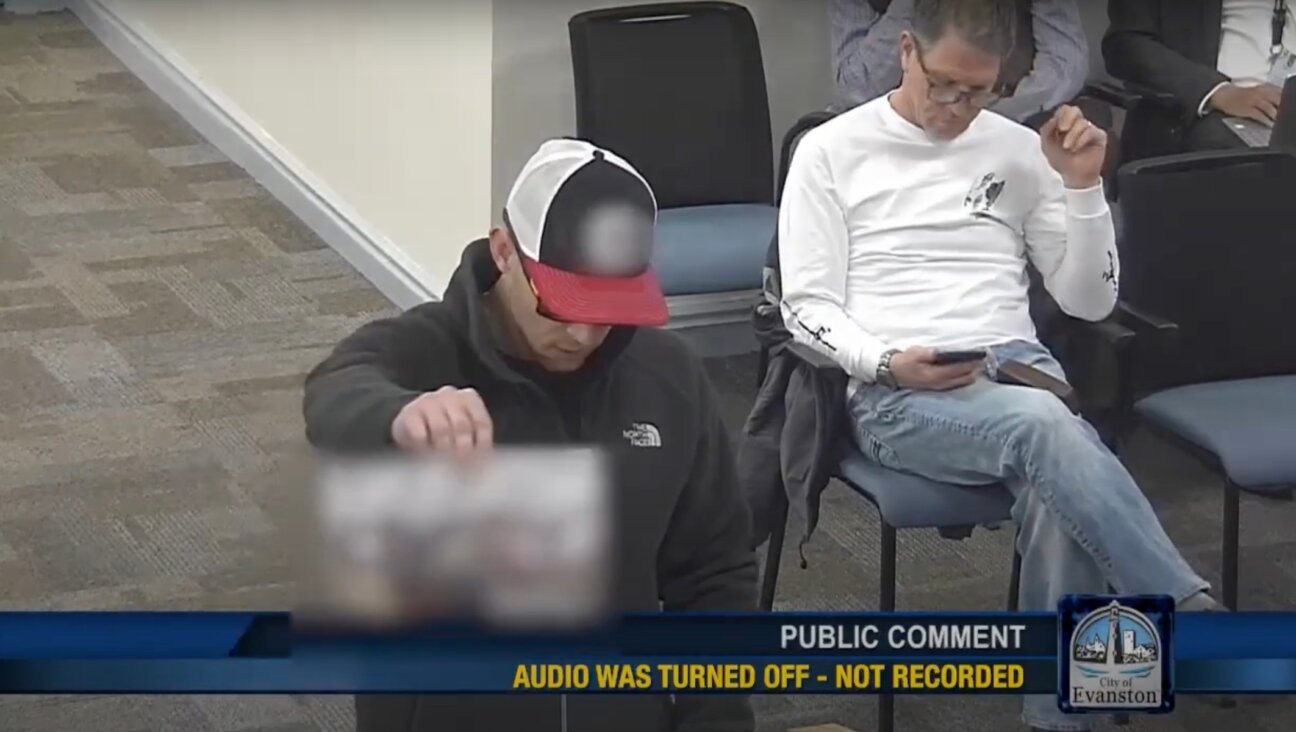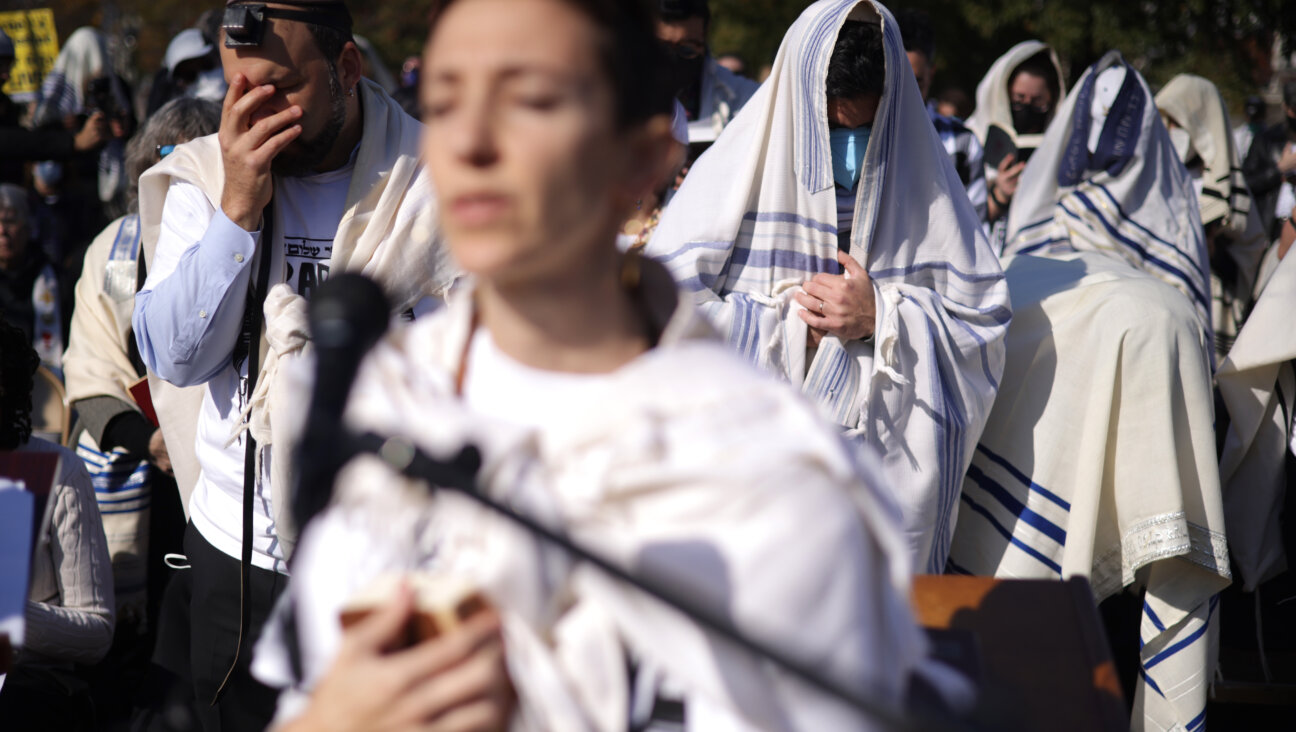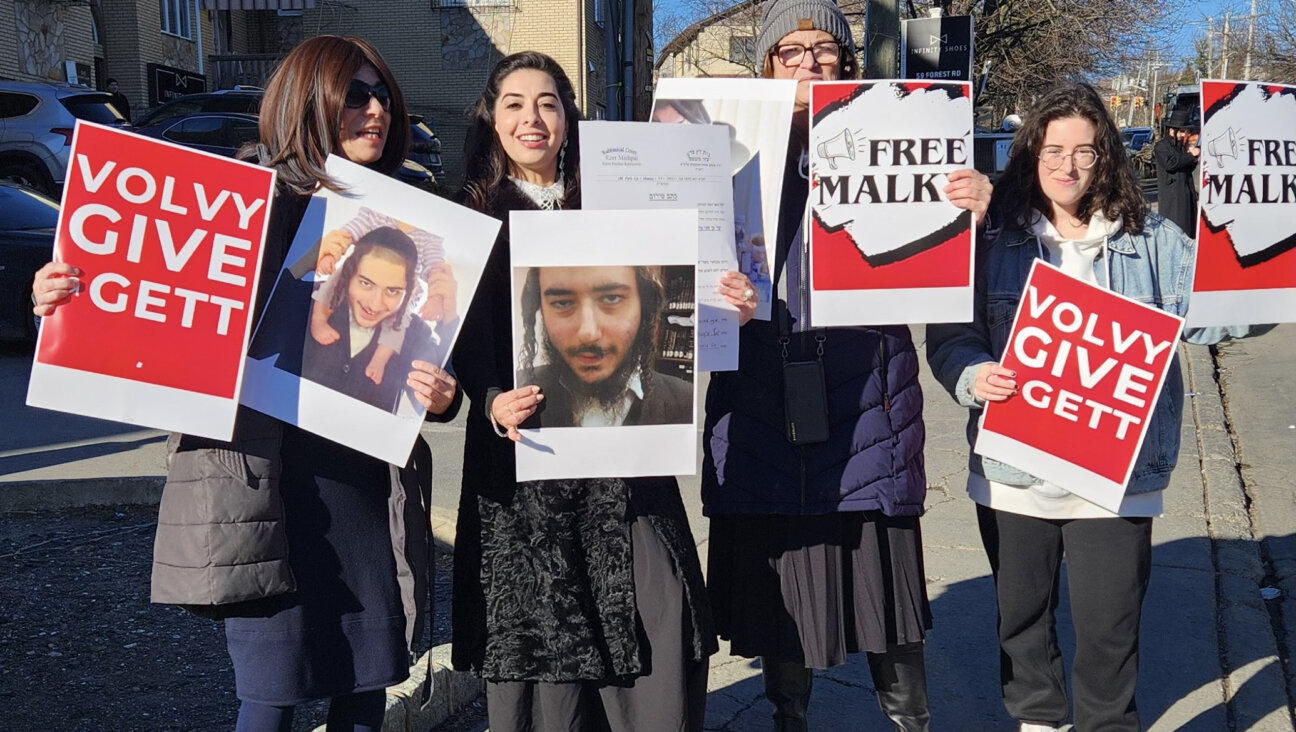Why did these rabbis seek a pardon for Elliot Broidy?

Businessman and Republican megadonor Elliott Broidy. Image by Stefanie Keenan/Getty Images for Pepperdine University
When former President Donald Trump, in one of his last acts in office, granted an executive pardon to confessed felon Elliott Broidy, the White House cited letters in Broidy’s support from some unusual sources: five Los Angeles rabbis.
Broidy, a multimillionaire businessman and prominent Jewish philanthropist, pleaded guilty to illegal foreign lobbying on Oct. 20. Broidy was covertly paid millions to push federal officials to drop one of the largest embezzlement investigations in the history of the Justice Department. He also lobbied officials to deport a critic of the Chinese government who resides in Brooklyn.
Why, with the ink barely dry on his guilty plea, did these rabbis come to Elliott Broidy’s defense?
One rabbi — who faced criticism about his decisions from congregants — provided a brief public statement to defend his support.
That statement, along with interviews with three of the rabbis conducted by the Forward, produced a long explanation — they believe that Broidy is a good person, a family man who regrets his mistakes; that his charity outweighs his malfeasance; and that he didn’t really do anything that bad — as well as a short one: Broidy is their friend and their patron, and he asked them to.
Their answers brought into focus a man whose unfailing generosity has made him indispensable to the Jewish community in the eyes of some of its most influential leaders, and the leaders who stayed loyal to a man even the second time he pleaded guilty to a felony.
“I look at him and I say, here’s a man that’s like an iron marshmallow — tough on the outside, soft on the inside,” said Rabbi Meyer May, executive director of the Simon Wiesenthal Center, an international pro-Israel human rights organization, who said he obliged Broidy without hesitation. “In my view, it was a matter of supporting a person who really had his heart in the right place.”
While Broidy was on Wiesenthal Center’s Board of Trustees, May said, he helped secure funding from a trust which pays for about 25,000 students from disadvantaged areas to visit the Wiesenthal Center’s Holocaust museum every year. May said the program, which costs around $500,000 annually, has been in place for five years.
In the case for which he was pardoned, Broidy lobbied federal officials to deport a Chinese dissident and drop its investigation of a billion-dollar embezzlement scandal at the Malaysian sovereign investment fund 1MDB. Broidy was paid $6 million by a Malaysian financier for his efforts, according to a Oct. 20 DoJ announcement of the plea. Broidy would have received a success fee of up to $75 million had the Justice Department dropped the case, according to the New York Times.
May described Broidy’s crime — failing to register as a foreign agent, which would require disclosing to the U.S. government who and what he was lobbying for — as a legal error, but not necessarily a moral one. Furthermore, May said Broidy maintained that he didn’t need to register since it was an individual, not a government, writing the check. (That assertion is incorrect. The Foreign Agents Registration Act includes foreign individuals in its definition of foreign principals.)
As for his thoughts on Broidy lobbying for the dropping of the investigation or for the deportation of a Chinese dissident, May said this was the first he had heard of it, and didn’t know enough to be comfortable discussing it. “I don’t deal with the social action of the center,” May said, “I deal with the money.”
He added, “It’s not rocket science to know that the Wiesenthal Center would be advocating for the dissident who’s working for human rights, not the other way around.”
May said Broidy is a complicated human being who deserved a second chance. “There were some things that are not admirable about Elliott Broidy, but there were some things that were.”
Letters written on Broidy’s behalf have helped the former Republican National Committee finance chair avoid prison in the past.
Broidy’s earlier run-in with federal authorities came in 2009, when he pleaded guilty to bribing New York state officials to invest public pensions through his private equity firm. Andrew Cuomo, then New York attorney general, called Broidy’s $1 million’s worth of illegal gifts, which included lavish trips to Israel, “an old-fashioned payoff of state officials.”
Though the felony charge he admitted to in that case carried a maximum sentence of four years behind bars, Broidy avoided prison after Kenneth Langone, an original investor in Home Depot, and former New York governor George Pataki wrote letters to the judge on his behalf. Broidy was also forced to pay $18 million in restitution. The charge was later reduced to a misdemeanor. (Langone was not mentioned in the Trump press release about Broidy, but Home Depot founder Bernard Marcus was.)
Rabbi Pini Dunner, rabbi of Young Israel of North Beverly Hills, an Orthodox synagogue where Broidy is a member, knew that letters had gotten Broidy out of trouble in the past, but it did not influence his decision to write to Trump.
“My role as a rabbi is to take care of those who come to me in need,” Dunner said.
And Broidy, who faced up to five years for the felony lobbying charge, had always been generous with Dunner. “He’s the kind of person that when you call him up and say you need money for something, he says, ‘Sure, how much do you need?’” said Dunner. “His generosity comes naturally.”
In addition to his contributions to local synagogues, Broidy has donated to myriad causes outside the Jewish community, including charities for veterans and at-risk youth.
Dunner said he did not expect to receive a donation in return for his letter, nor did he think future donations depended on it. Indeed, he said he would have done this for any congregant, irrespective of their party affiliation, financial heft, or malfeasance.

Rabbi Pinchas Dunner
But the Young Israel rabbi also believed that being a major Trump donor had put a target on Broidy’s back, and that the charge against his congregant was blown out of proportion.
“The one thing I’ve learned in America is everyone is guilty of a crime,” said Dunner, who was born in the United Kingdom. “If you were audited, there are things that are irregular in your tax returns. Once they decided to go for Elliott Broidy, they were going to find something.” (The charge was brought by then-Acting Assistant Attorney General Brian C. Rabbitt, who was previously Attorney General William Barr’s chief of staff. Barr was a Trump appointment.)
Broidy ran afoul of a law that is by nature broad, but which has received increased vigilance since Trump’s election.
The Foreign Agents Registration Act, or FARA, was passed in 1938 to combat Nazi propaganda. But the Department of Justice brought only seven FARA cases between 1966 and 2015, and FARA registrations falling sharply in the 1990s. It revived enforcement of the statute in recent years after an initial push in 2016 by Congress, which has since passed about a dozen bills to increase funding and eliminate exemptions.
It was mere months into the Trump presidency when Broidy, who helped raise a record $107 million for Trump’s inauguration fund, agreed to lobby the president, then-Attorney General Jeff Sessions, and other high ranking White House officials to drop the 1MDB investigation.
According to court documents, Broidy admitted to trying to set up a golf outing in the summer of 2017 for Trump and Prime Minister Najib Razak, who was already known as the subject of the investigation. (Najib is suspected of pilfering $3.5 billion from the fund.)
Simultaneously, Broidy was advocating for the removal of Chinese billionaire and political dissident Guo Wengui on behalf of the Chinese Communist Party. Broidy attempted to set up meetings for a Chinese government official with Sessions and then-Homeland Security Secretary John Kelly when the official visited the United States.
Though both lobbying efforts were unsuccessful, Broidy’s failure to disclose that a Malaysian national was paying him millions of dollars for his work ran afoul of FARA.
Rabbi Mordechai Suchard, the executive director of the Jewish education organization Gateways, said he was not very familiar with what Broidy did. But he said it wasn’t necessary to know all the details of a crime to write a letter to the president seeking a pardon for it.
Like Dunner, Suchard painted Broidy as the victim of a political agenda in the Justice Department, and that he pleaded guilty only to make the case go away.
“If somebody has the government going after them, if somebody is a target, there is only so much an individual can do,” said Suchard.

Rabbi Mordechai Suchard
Regardless of what Broidy did, the rabbi said, his charity work outweighed his criminal record.
Suchard cited the story that first acquainted him with Broidy, whom he now counts as a close friend. At one point during the height of the Second Intifada, the rabbi said, Broidy was the only American at the King David Hotel in Jerusalem. He was there to launch a fund supporting Israel’s mainstream economy — a less immediately lucrative venture, Suchard explained, when American investors mostly poured their money into high-tech. Since then, Broidy has become a regular donor to Gateways.
“He just did it out of the goodness of his heart,” Suchard said. “That’s the real Elliott Broidy.”
Rabbi Steve Leder, senior rabbi of Wilshire Boulevard Temple, a Reform synagogue in Los Angeles where Broidy is a member, emailed a statement to members about his letter after receiving complaints from congregants about his letter to Trump on Broidy’s behalf.
Leder officiated the bar mitzvah of Broidy’s son, and the Broidy family is a major donor to Wilshire Boulevard Temple’s elementary school. A school bulletin published in 2019 said Broidy and his wife, Robin Rosenzweig, contributed between $25,000 and $49,999 to the endowment that year.
“I did for this congregant what I would have done under any administration for any Temple member who has sinned, repented and changed his or her life for the better as a result,” Leder said in the statement.

Rabbi Steven Leder with Robin and Elliot Broidy at a 2016 Wilshire Blvd. Temple event. Image by Wilshire Blvd. Temple
Reached by the Forward for comment Monday, Leder declined to elaborate on how Broidy had changed or say whether he had ever solicited a pardon for anyone else.
Rabbi Steven Burg, chief executive officer of the international Orthodox education organization Aish HaTorah, also wrote to Trump on Broidy’s behalf. Burg did not respond to multiple requests for comment.
Elliott Broidy did not respond to multiple requests for comment.
The rabbis did not know their letters would be mentioned by the White House.
“They published the press release and there’s my name,” said Dunner.
As to whether he was concerned that vouching for a twice-convicted criminal would reflect poorly on him, Dunner emphasized that Broidy was a man with a wife and children who had admitted his mistake.
The portrayal of Broidy as a family man clashes with his public image. In 2018, Broidy was sued by a former Playboy model, Shera Bechard, who said Broidy had agreed to pay her $1.6 million to keep quiet about an affair and an abortion.
Dunner said he had seen far worse behavior in his lifetime. “I want the people to know that I will go to bat for them even if they’re sinners,” he said.
Louis Keene is a freelance writer in Los Angeles. Email him or follow him on Twitter.
Ed. Note: A previous version of this story erroneously credited the gift of a wing at Cedars-Sinai Medical Center to Elliot Broidy. Broidy has donated $250,000-$499,000 in cumulative giving to the hospital, according to Cedars.






















